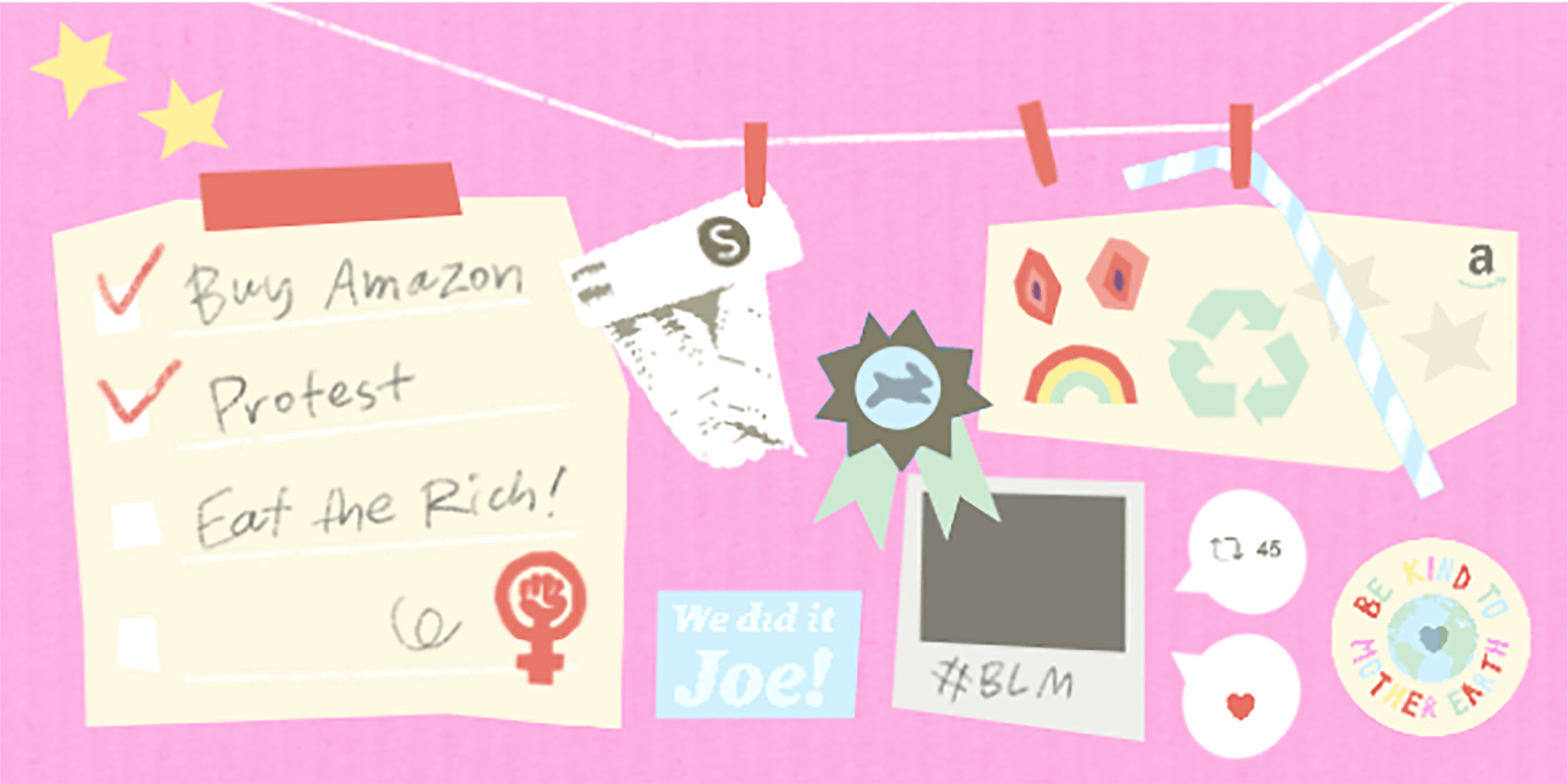After a year of routinely exceeding 12 hours of screen time a day, there’s a phrase that’s been dominating my social media feeds: “There’s no ethical consumption under capitalism.” This statement, with its overt ties to Marxist political theory, essentially argues that exploitation is inevitable under a capitalist system of labor and profit. In my experience, this saying is most often deployed by TikTok or Instagram users in an attempt to justify their financial support of notoriously problematic companies such as SHEIN or Amazon. This catch-all phrase attempts to signal the user’s skepticism of all corporations—as if that somehow cancels out the moral weight of purchasing from them.
While they’re certainly oversimplified, I can empathize with these feelings of defeatism. From environmental activists’ constant calls to go vegan to the endless supply of hate comments left on teenage girls’ Forever 21 hauls, my social media feed never fails to remind me of all the ways I could be doing better. It’s not that boycotting Amazon or avoiding fast fashion shouldn’t be encouraged. But relying solely on individual solutions to systemic problems will inevitably be insufficient. And when we combine this individualistic approach to sustainability with the distorting performance incentives of social media, we risk creating an online activist culture that values the appearance of personal morality at the expense of system-wide solidarity.
Neoliberalism and social media are uniquely alike in their ability to activate our identities as individuals. In the case of neoliberalism, Ronald Reagan’s deregulated economy strove to define market forces as the central organizing principle of modern life. On the psychological level, this emphasis on market competition transformed public citizens into private consumers: A 2017 Cambridge University study found that those who came of age under Margaret Thatcher’s neoliberal economic policies were more likely to express individualistic tendencies than earlier generations. Whether it be calls to take shorter showers or even have fewer children, the environmentalist movement of the past several decades has morphed itself to match the neoliberal framework, promoting a set of responsibilities sociologists Michele Micheletti and Dietlind Stolle refer to as “sustainable citizenship.”
Dutch political scientist Karijn van den Berg argues that because governments have shifted responsibilities to the individual, “sustainability has become an empty buzzword without significant meaning, employed by big corporations that seem to focus on economic sustainability only.” Reliance on market forces to fix market failures such as climate change is inevitably limited in its usefulness. As someone who owns a plastic “There Is No Planet B” laptop sticker that was shipped to me on an airplane that released excesses of greenhouse gases into the atmosphere, I am well aware of the inherent irony of “green capitalism.”
Similarly, social media platforms constantly push us to overvalue our own opinions. As a result, opinion formation can seem like an appropriate substitute for actual political organizing, giving rise to a new era of so-called “eco-shaming.” Admittedly, researchers have found that in some instances, social shame can be incredibly productive in inspiring individual changes; however, this shame becomes less useful when we consider how social media’s engagement algorithms can utterly distort our sense of scale.
In order to compete in the internet’s marketplace of ideas, social media companies incentivize users to convey potentially nuanced points as hot takes designed to take down the other side. Driven by profit-maximizing algorithms, these sites have effectively turned activism itself into a product to be bartered and sold. It seems that the internet produces such strong incentives to shame one another that we often forgo all that we know about empathetic persuasion and allow the social reward of activism itself to become our focus. In doing so, we risk overwhelming otherwise sympathetic consumers from making any lifestyle changes at all—after all, if there’s “no ethical consumption under capitalism,” why even bother?
My goal is not to give anyone, myself included, a permission slip to support irresponsible corporations or to live unsustainably. On the contrary, as we each strive to do better, it’s worth remembering what we’re actually fighting for: If we truly want system-wide change, building social cohesion in our own communities, both online and in-person, has already proven extremely effective in helping societies take action against climate change. Ultimately, with “green capitalism” and activist social media still both utterly entangled in the very capitalist structure we’re attempting to denounce, we must create an alternate path forward–one that brings us closer together, rather than tears us apart.
